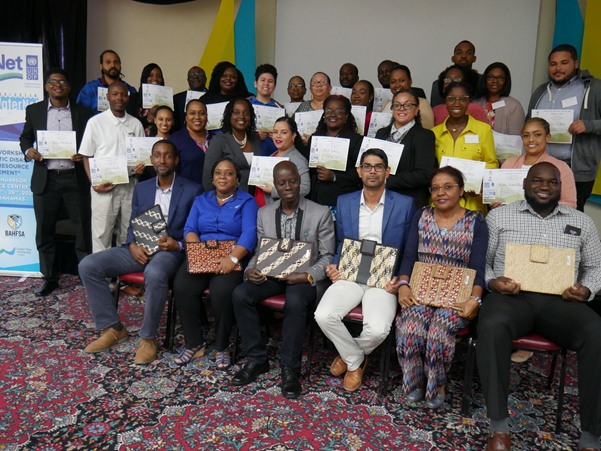On 24-26 February, the Caribbean WaterNet/CapNet-UNDP hosted a Training of Trainers (TOT) Workshop on Hydro-Climatic Disasters and Integrated Water Resource Management in Nassau, Bahamas. The workshop was facilitated by Dr. Ronald Roopnarine (Caribbean WaterNet/CapNet UNDP), Dr. Mark Wuddivira (FFA, UWI), Dr. Gaius Eudoxie (FFA, UWI), Ms. Simone Lewis (GWP-C), Mr, Ryan Zuniga (CCCCC) and Ms. Gina Sanguinetti Phillips (CCRIF-SPC). The training covered several topics:
Hydro-Climatic Disasters and the Caribbean Context – Dr. Gaius Eudoxie (UWI)
Participants discussed the regional context and its vulnerability as it relates to hydro-climatic disasters. “A lot of people don’t understand the devastation associated with storms and tend to ignore evacuation warnings” expressed the participants. “Dorian really showed our weaknesses in communication within our country. Adaptability: we need to think about the possibilities of stronger storms and the unexpected” they emphasised.
Water Related Disasters and IWRM- Ms. Simone Lewis (GWP-C)
Water-Related Disaster and IWRM concepts along with Natural / Human Induced disasters and the relationship between vulnerability and coping capacity were discussed.
Disaster Risk Reduction (DRR) and Flood Risk Management- Dr. Ronald Roopnarine (Caribbean WaterNet /UWI)
In this session participants were appraised on the modern concepts attached to disaster risk reduction along aside to the four components of DRR (Risk identification, Awareness creation, Risk management and Governance & education). The session also focused on highlighting the importance of the participatory approach and indigenous knowledge in DRR plans.
Impact of Climate Change and Variability – Mr. Ryan Zuniga (CCCCC)
Highlighting the current climatic trends and the global climatic system, this session provided the necessary theoretical knowledge to understand the implications of climate change and its potential impacts on the region.
Drought Risk Management- Dr. Mark Wuddivira (UWI)
In this session participants were provided with a theoretical understanding of the Drought concept. The impacts of droughts were discussed on a sectorial basis. Focus was placed on the agricultural sector, where rural livelihoods have been significantly impacted in the past.
Disaster Risk Financing and the Role of CCRIF SPC- Ms. Gina Sanguinetti Phillips (CCRIF-SPC)
This session aimed to provide participants with an understanding of the regional economic impacts of natural disasters and the services provided by CCRIF-SPC in response. Examples such as Hurricane Ivan (Grenada-2004) and Maria (Dominica-2017) were highlighted. “Mitigation alone is not sufficient to effective cope with natural hazards; risk transfer, risk financing and social protection strategies are essential towards recovery efforts post disaster” the participants agreed.
Emergency and Humanitarian Response – Dr. Gaius Eudoxie (UWI)
The outcomes of proactive preparedness vs a reactive response were outlined, noting the tendency for the reactive approach to result in crisis management and the consequent issues.
To conclude, a guest presentation on “Interventions in West Africa- Cape Verde” was also given by Ms. Tatiana Rosario, a participant who joined us from West Africa.
The training was held in collaboration with The Bahamas Agricultural Health & Food Safety Authority (BAHFSA), the Faculty of Food and Agriculture, University of the West Indies St. Augustine Campus (FFA, UWI) the Global Water Partnership-Caribbean (GWP-C), Caribbean Agricultural Research and Development Institute (CARDI), The Caribbean Catastrophe Risk Insurance Facility-Segregated Portfolio Company (CCRIF-SPC) and the Caribbean Community Climate Change Centre (CCCCC).

